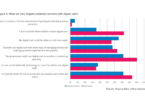Two consumer groups, AGE and BEUC, have voiced concerns about financial inclusion not being given sufficient consideration in developing the digital euro. AGE is worried that financial inclusion is an afterthought in the central bank digital currency (CBDC) design. BEUC is concerned that using the same intermediaries, such as banks, is unlikely to achieve better financial inclusion outcomes. Part of the issue is a focus on smartphone usage.
AGE and BEUC expressed their opinions as members of the Euro Retail Payments Board (ERPB). It provides strategic input for eurozone payments and comprises European Central Bank (ECB) staff, payment providers and euro user groups.
AGE is concerned digital euro is unintentionally exclusive
“We fear that dealing with inclusion as a separate strand toward the end of the project development process will be very challenging and counterproductive,” wrote AGE.
“Financial inclusion issues should have been mainstreamed in all discussions and certainly before important decisions were made on some options which now might result (unintentionally) in financial exclusion. Trusting PSPs (payment service providers) to know best end users’ needs is a wrong approach if the purpose is to develop a digital ‘public money’ payment instrument.”
The organization requested focus groups to include older age groups.
BEUC is not keen on existing intermediaries for distribution
BEUC, the umbrella body for 45 European consumer groups, said that existing intermediaries, such as banks that will distribute the digital euro, will not enhance financial inclusion. The current system poorly serves vulnerable groups, including those without access to a bank account, people with disabilities, the digitally illiterate and the elderly.
It wants to see financial inclusion goals included in the criteria for CBDC intermediary selection. But it would actually prefer the CBDC to be distributed by the central bank as it believes that would favor financial inclusion.
It also is keen for the digital euro to guarantee the same privacy as cash. That would make the implementation of anti-money laundering rules tricky. While the ECB has said it wouldn’t access personal details, intermediaries will have the data, which is not the case with cash. The BEUC highlighted that open banking is frequently presented as the only option effectively forcing consumers to share their data.
The prioritization of smartphone applications to reach the broadest audience has also raised issues. “A solution with no/low technical requirements (e.g. accessible for consumers not owning a smartphone) should be prioritised to achieve financial inclusion,” said BEUC.
The feedback from AGE, BEUC and other ERPB members was published along with an agenda for a digital euro ERPB session held yesterday.
A secret digital euro decision-maker meeting?
In addition to yesterday’s ERPB digital euro meeting, there was a gathering of Eurozone central bank governors in Finland, where the digital euro was discussed. The meeting was publicized, but not the agenda. Politco had the scoop.
Meanwhile, Eurozone finance ministers published their political positions on the digital euro last month. The conclusion is that they don’t want a programmable digital euro where the usage can be restricted in any way (such as only being spent on food). Feedback from the ERPB concurs with this stance.






